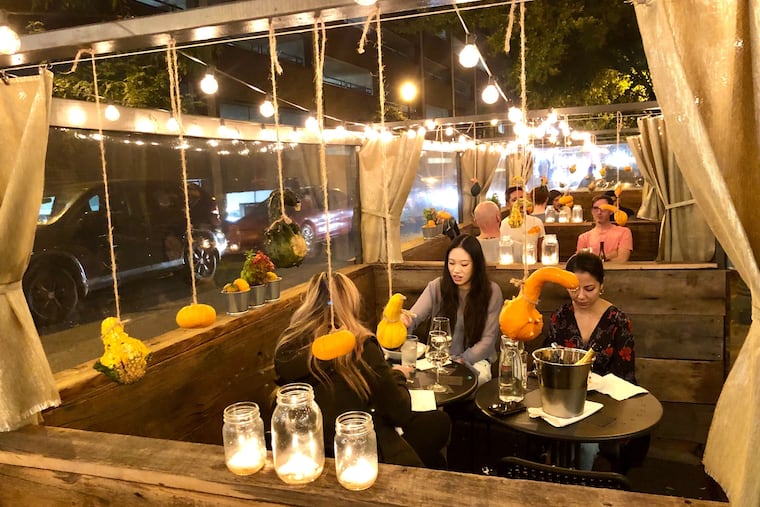Outdoor dining streeteries in Philadelphia could become permanent under councilmember’s proposal
Councilmember Allan Domb's two bills will go to a Council committee for consideration. Not surprisingly, the restaurant community supports the move.

City Councilmember Allan Domb on Thursday introduced legislation to permanently allow expanded outdoor dining, which was authorized in 2020 to help restaurants survive the pandemic.
The city’s rules on expanded outdoor dining, including the structures known as streeteries, are set to expire at the end of the year. Domb’s legislation, headed now to a Council committee for consideration, would make them permanent but adds regulations and requirements.
Domb had support from six other councilmembers, but not Council President Darrell L. Clarke, who said through a spokesperson that the new rules would remove Council from the approval process. He said he wanted to see applications approved or denied after “a more deliberative public process — including considering the opinions of neighbors, businesses, others who use the streets, including pedestrians, cyclists, and the handicapped.”
Domb’s bills propose regulations for sidewalk cafes and streeteries, which occupy on-street parking spaces. “We need to establish legislation that would continue this great city amenity that we’ve enjoyed as a result of the pandemic,” Domb said.
Domb said he worked with Mayor Jim Kenney’s administration, the restaurant industry, neighborhood business districts, and disability advocates to develop the legislation. Domb, whose personal business investments include restaurants and real estate, said it adds “a greater level of safety, transparency, accountability, and enforcement” compared with the measures of the emergency expansion put into place last year.
Not surprisingly, the restaurant community supports the move. “Tria’s [two] streeteries and expanded sidewalk cafes have done nothing less than allow our company to survive — and to keep our team members employed during COVID restrictions,” said Jon Myerow, an owner of the popular Center City cafes.
The supporters are countered by some detractors, who believe that reserving public spaces for commercial purposes is a power grab.
Cosponsored by Councilmembers Cherelle Parker, Kenyatta Johnson, Bobby Henon, Katherine Gilmore Richardson, Derek Green, and Kendra Brooks, the proposed bills would require restaurants to apply for permits from the Department of Licenses & Inspections, pay a $200 fee, and meet accessibility requirements by leaving six feet of space on sidewalks for people to pass and leaving curb cuts open.
Streeteries would not be permitted in bike lanes or travel lanes, and a barrier must be in place to protect tables from traffic. Streetery seating would be capped at the total number of indoor dining seats in a restaurant. L&I, which would be responsible for enforcing the regulations, would also have the authority to remove dining structures that are not up to code or are not being used.
Kevin Lessard, a spokesperson for the Kenney administration, said the mayor’s office was reviewing the legislation but supports the general concept of keeping the expanded outdoor dining. ”Ultimately, the administration strongly envisions streeteries and the expanded sidewalk dining program being incorporated into a permanent version of the outdoor dining initiative but with limitations regarding structures related to public safety and accessibility,” Lessard said.
The streeteries have changed the landscape not only in Center City but in other neighborhoods such as Fishtown and West Philadelphia.
Saba Tedla, who owns Booker’s in West Philadelphia, said she has been long awaiting a city decision on the streeteries’ future. With winter coming, she said, it would take a while to erect and dismantle her weatherized $18,000 structure, which allows 40% additional seating. Having it made permanent would also be “a good game-changer” in case of a COVID-19 flare-up.
“They’re cute and fun and bring energy to the block,” said Daniel McLaughlin, whose Mission Taqueria at 1516 Sansom St. in Rittenhouse has about 60 seats on the street. The block, now a veritable outdoor dining room, is closed to vehicles to allow streeteries for six bars and restaurants.
Mission had been shut down for much of 2020, and then could reopen with only 40 of its 140 indoor seats. The streetery also allows patrons who use wheelchairs to dine there, since the restaurant is up a flight of stairs.
“Our streets are far more valuable as genuine destinations rather than parking spots,” said Aaron Bauman, a volunteer with the urbanist political action committee 5th Square. As a self-described “technologist and Twitter bot writer,” he also created an interactive map showing Philadelphia’s 800-plus cafes and streeteries.
“The amount of barriers to entry within the old process for right-of-way permits created an inherently inequitable system,” said Katrina Johnston-Zimmerman, a 5th Square volunteer and board member of South Street Headhouse District. “The changes that came out of the pandemic response are exactly what was needed to make Philadelphia’s streets more humane public spaces. These improvements should be retained — and expanded upon — for the future livability of our city.”